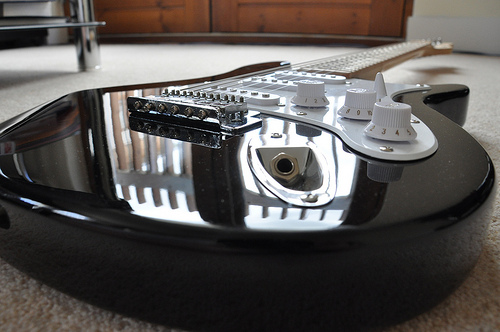Today, the electric guitar is one of the most iconic symbols associated with the music industry. If a young musician wants to learn guitar, increasing numbers of them are turning to an electric instrument, rather than taking the traditional, and once the only, route of learning to play an acoustic first.

Development of Guitars
While the roots of acoustic guitars can be traced back as far as 1,000 BC, electric guitars are less than 100 years old. Electric powered music boxes started to be developed in the 19th century, but it wasn’t until the 1920s when Lloyd Loar, who was an engineer at the now legendary Gibson guitar company, first attached electric pickups to a viola and a string bass that people started to explore the possibility of an electric guitar.
Inventing the Electric Guitar
To this day, there is much dispute over who actually invented the electric guitar. While there were many innovations happening around that time, guitar legend Les Paul was one of the first to experiment with attaching microphones to guitars, for example, George Beauchamp’s 1931 “Frying Pan” guitar is widely credited as the first commercial version of the instrument.
The first documented live performance with an electric guitar was in 1932, by an American musician named Gage Brewer, performed using Beauchamp’s instruments; Brewer is also thought to be responsible for the first track to be recorded featuring an electric guitar, although he never released any music himself.
Later Development
Development of electric guitars would continue throughout the 1930s, with Gibson’s first guitar being produced and sold in 1936, the ES-150 (standing for ‘Electric Spanish’ and the $150 cost of the instrument), which also came with an amplifier. It would be fair to say the instrument wasn’t what we expect from Gibson today; the ES-150 suffered a lot of criticism owing to the unequal loudness the guitar strings produced!
Les Paul & Fender
Later in the decade, Les Paul continued to experiment with his guitars and eventually came up with a design known as ‘The Log.’ Many mistakenly believe that this was the basis for the Gibson Les Paul guitars that are sold to this day. In fact, the Gibson Les Paul was designed later, launched in 1952, and was developed alongside Ted McCarty, a guitar pioneer who was President of Gibson for 16 years, and is widely credited as being the man to turn them into the company they are today, although there was a 20 year period of instability after he left in 1966.
This decade was also when Leo Fender introduced his first guitar to the market, in 1950. In 1954, the famous Fender Stratocaster, still one of the most popular guitars in the world, was launched.
Electric Guitars Today
While electric guitars have continued to evolve and various engineers and musicians have pioneered a number of add-ons and innovations, the idea behind the instrument remains rooted in these early innovations. Despite several legendary artists having their own ‘signature’ instruments launched by Gibson, Fender, and other instrument manufacturers, the credit and story behind them very much remains with the early pioneers.
Image Source: David
Are you a guitarist? Check out our full range of online guitar lessonsAre you a saxophonist? Check out our full range of online saxophone lessons
Subscribe to Pro Music Tutor from as little as £7.99 per month
Related Posts
-
Is Music Theory Important to Modern Musicians?
The importance of music theory is a hot debate topic in the world of professional music. Some believe knowledge of music theory is what makes you a true musician, whereas some feel their lack of music theory knowledge is like a badge of honour. With the eternal debate over the importance of music theory raging […]
View All >> -
5 Ways Spanish Music Influenced the World
Contemporary popular music has transcended all national boundaries, with different types of music being performed and listened to in all corners of the world. Each culture also adds their own little tweaks and twists to the music, constantly creating new sounds and influences. Spanish music has deeply influenced the popular music we listen to today. […]
View All >>
Latest Blog Entries
-
The Benefits of Online Music Education
Learning music has never been easier, since the internet and modern technological advancements have opened the doors to countless possibilities, expanding the subjects people can choose from and how the lessons are taught. Now, people can study a whole host of music-related topics; from learning to play guitar or DJing, to understanding the inner workings […]
View All >> -
Essential Jazz Guitar Scales that are Easy to Learn
Improvising in jazz requires the ability to play in different keys over different chords. Results certainly do not come overnight, but with diligent practice, you would be surprised by what you can achieve. Many people ask me about what scales I use as if they were some big secret. While knowing your scales is very […]
View All >>
Blog Categories
- Categories
- Guitar Tips (93)
- History (36)
- How-To (38)
- Interviews (3)
- Music Industry (121)
- Prolinks Guitar (2)
- Prolinks Lessons (3)
- Prolinks Tutor's Profile (1)
- Saxophone Tips (40)
- Uncategorized (6)
Tags
Archive
- November 2018 (1)
- February 2018 (1)
- December 2017 (1)
- November 2017 (1)
- October 2017 (1)
- July 2017 (4)
- May 2017 (2)
- April 2017 (1)
- August 2016 (2)
- July 2016 (1)
- June 2016 (2)
- May 2016 (3)

